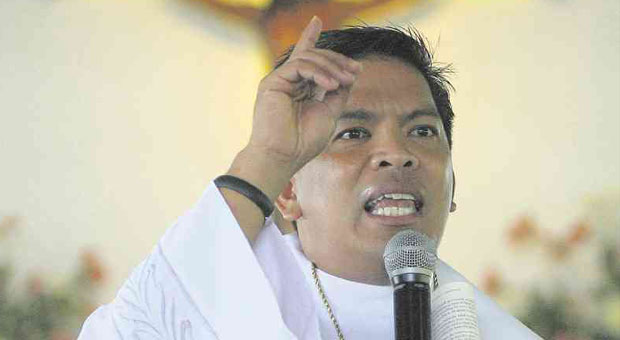Healing priest Fr. Fernando Suarez collapses, dies

Healing priest Fr. Fernando Suarez
Updated @ 12:01 a.m., Feb. 5, 2020
MANILA, Philippines — It was as if controversial “healing priest” Fernando Suarez had just waited to be absolved of the sexual harassment allegations that hounded him for years before succumbing to a massive heart attack in the place he loved most — the tennis court.
Suarez, a fan of tennis star Rafael Nadal, collapsed while playing his third singles set at Alabang Country Club on the opening day of the 11th National Priests’ Tennis Championship. He was to celebrate his 53rd birthday on Friday, Feb. 7.
His friend Melvin Castro, chancellor of the diocese of Tarlac, said Suarez was rushed to Asian Hospital. Deedee Siytangco, spokesperson for Suarez, said he was already “unresponsive” on the way there.
Edith Fider, a personal friend of Suarez, said he “must have overstretched his energy” when he insisted on playing a third set after winning two games earlier.
Article continues after this advertisementSiytangco said witnesses recalled Suarez “was sluggish but still went on and … collapsed” in the middle of the third set.
Article continues after this advertisement‘As if the Lord just waited’
Suarez was scheduled to celebrate his birthday Mass on the De La Salle Santiago Zobel campus in Ayala Alabang after the tennis matches.
“I was shocked, I couldn’t believe it,” Castro said. “The last time we talked was when the decree saying he was not guilty was issued by the Vatican. He was so happy then. I remember him saying ‘It’s about time.’ It’s as if the Lord just waited for him to be absolved … this is saddening.”
Suarez was known in the Philippines for his healing ministry that began in 2006 after serving in a religious congregation in Canada.
Many who had gone to his well-attended Masses reported feeling instant relief as he placed his hands on their heads.
Suarez, who once complained jokingly that he could heal other people’s ailments but not his own, celebrated Mass at an evacuation center at his birthplace of Barrio Butong, in Taal, Batangas, six days after Taal Volcano erupted on Jan. 12.
Cleared
In 2014, he was barred from saying Mass and giving sacraments in several dioceses, including Cubao, Lingayen-Dagupan, Malolos and Malaybalay following allegations of sexual harassment filed by two altar boys on Iling Island in San Jose, Mindoro Occidental, in March 2014.
On Jan. 6, 2020, the Vatican’s Congregation for the Doctrine of the Faith ordered the Philippine Church to issue a decree of notification informing Suarez he was “not guilty” of the charges.
The ruling came after the two accusers recanted. Suarez had insisted that he was out of the country at the time of the alleged offense. The notification was signed by retired Bishop Antonio Tobias.
Suarez described the decision not only as a “vindication” but also a “triumph for the Catholic Church,” which in recent years has been battered by numerous allegations of priests preying on their flocks.
In a 2017 interview with Inquirer Lifestyle, Suarez stressed his love for tennis, saying the game had a huge part in his life—offering physical fitness, therapy and a chance to mull over his daily concerns.
Spirituality in sport
He admitted struggling with his serves at first, until a friend who is a professional player advised him to bend his knees while doing so.
“When you bend your knees when you serve, you generate more power. Oh, my God! It was great! It was so beautiful! You have no idea. I can go on and on about my reflections that put spirituality in the sport. When you bend your knees, you become humble,” Suarez said.
He said tennis taught him to never underestimate an opponent. “Do not discriminate or judge a player by his looks. You never know. You might think he is not good. But the moment you underestimate your opponent, you lose.”
Another lesson about serving “bad balls,” which land outside the court, seemed to eerily apply to his recent ordeal: “From this I learned that we can choose which balls we are going to catch in life. Everything bad that other people say about us, leave them. Those balls are out. You don’t need to catch them. And it won’t hurt you because it’s a point against the one who hit the ball, not you.”